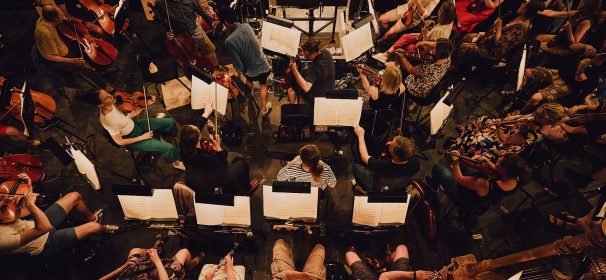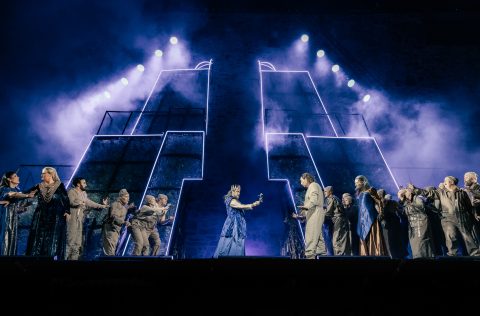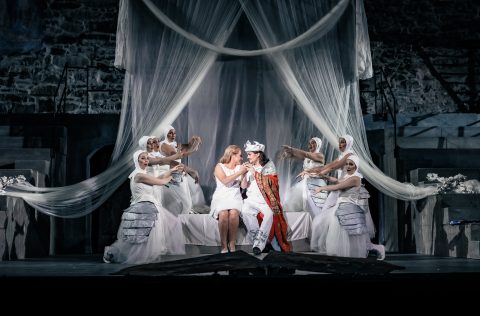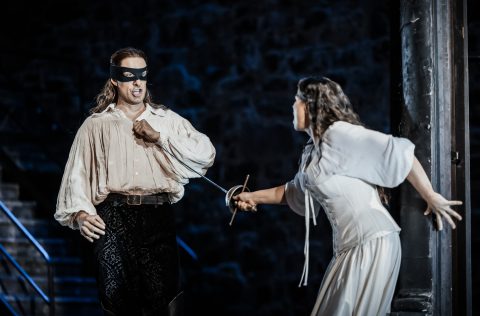When the most stirring choral scene in the opera Nabucco rings out next summer inside the stone walls of the Olavinlinna castle, its message will leave no one unmoved. From the very beginning, it has had a wider significance than just opera. In this rendition, it affects every one of us.
The Savonlinna Opera Festival’s new production next summer is of Giuseppe Verdi’s breakthrough work Nabucco, an opera that has served political purposes throughout its history. The story by Bartolomeo Merelli, the top librettist of his day, is set in Old Testament times, long before the beginning of the Common Era. The Babylonians led by Nabucco were the oppressors and Zaccaria’s Hebrews were slaves dreaming of freedom.
Political opera
In the 1840s the north-east of Italy belonged to Austria, while the rest was divided into six independent states. The idea of unification, promoted by the Young Italy movement, was gaining support. When Nabucco was first performed in 1842, audiences immediately realised what the story was really about. And so, overnight, Va pensiero, one of the finest choral numbers in the history of opera, with its main theme in unison, became the unofficial national anthem of the Italians and Nabucco became a hugely popular political opera at a time when the treatment of politics in art was virtually forbidden.
‘Climate change is the most serious war of our time and it is being waged against nature.’
Director Rodula Gaitanou
Today, it would be easy to situate the events of Nabucco in various times and places on a world map filled with political crises, but the Savonlinna version does not go down that path. The production deals with the greatest crisis of our time, which affects every living creature on earth, regardless of age, nationality or species. ‘Climate change is the most serious war of our time and it is being waged against nature’, says director Rodula Gaitanou. ‘Our version is an ecological manifesto.’
International work partners
Gaitanou has directed works by Verdi before, but this is the first time she has taken on Nabucco. The set and costumes are designed by Takis, Gaitanou’s compatriot in two respects: both are of Greek origin and live in London. takis also knows Finland. He studied at the Aalto University School of Arts, Design and Architecture in the faculty of film and stage design, graduating in 2021. Rodula Gaitanou studied musicology at the Sorbonne University in Paris and opera performance at the Université Paris 8 Vincennes-Saint-Denis. She has also studied opera with the Jette Parker Artists Programme at the Royal Opera House in London. The duo have a long history of collaboration.
‘In this production, no one dies in the end. Va pensiero resounds as a great, unanimous message of hope!’
Nabucco in this time
In the world created by Gaitanou and takis, Nabucco leads a group of technocrats who believe in machinery and individualism. Zaccaria is the leader of a group of eco-warriors fighting for humanity and nature. ‘Verdi’s characters are exceptionally strong. In this production of Nabucco, the two male leads are matched by Abigaille and Fenena, resulting in four instead of two equally important leading roles. Vocally, the production is really interesting, with some very fine singers in the roles.’
The staging is inspired by the design language of Babylonian pyramids and palaces, but the execution is interesting. In the set that Takis has designed, lights and mirrors play an important role in the creation of the visual environment. Green nature is fighting for its own space and the costume design follows the dichotomy of the roles.
And Va pensiero? ‘In this production, no one dies in the end. Va pensiero resounds as a great, unanimous message of hope!’
Nabucco at Olavinlinna Castle on 6th, 8th, 11th, 16th, 19th, 22nd, 24th, and 26th of July, tickets and additional information here.
Original text in Finnish: Hannele Eklund. Translation by Andrew Mellor








